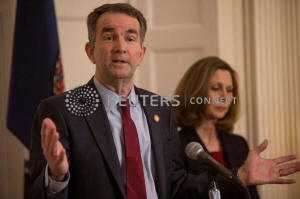|
Blackface scandals highlight U.S.'s
troubled racial past - and present
 Send a link to a friend
Send a link to a friend
 [February 08, 2019]
By Andrew Hay [February 08, 2019]
By Andrew Hay
(Reuters) - The painful history of
blackface in America was highlighted this week as two top Virginia
Democrats came under fire after admitting to having blackened their
faces to resemble African-Americans while in college in the 1980s.
White Americans have been blackening their faces to mimic blacks for two
centuries. While the practice is less common than it was decades ago,
African-American scholars say it persists in some corners as evidence of
racism.
Apologies by Virginia Governor Ralph Northam and Attorney General Mark
Herring followed blackface appearances by celebrities such as actor
Billy Crystal and late-night talk show host Jimmy Fallon in recent
years.
WHEN DID BLACKFACE BEGIN IN THE U.S.?
Blackface began in New York vaudeville shows of the 1830s, when slavery
was still legal in the U.S. South, and featured white performers who
blackened their faces with burnt cork or shoe polish to caricature
blacks on plantations as lazy and stupid.

With ugly, exaggerated features, and wearing tattered clothes, these
"minstrels" made fun of enslaved Africans as superstitious, hypersexual
and cowardly, according to the National Museum of African American
History and Culture in Washington.
"It supported the idea of slavery," said Wornie Reed, director of the
Race and Social Policy Center at Virginia Tech. "If these people are
like that, then of course they should be in slavery and taken care of."
WHY DID BLACKFACE BECOME SO POPULAR?
An American minstrel sub-industry of songs, sheet music, makeup,
costumes and toys flourished through the mid-19th century even as the
Northern and Southern states fought the Civil War that led to the
abolition of slavery in 1865. Songs that defamed African-Americans
became popular in the 1880s and 1890s.
By the early 20th century, black entertainers used blackface to gain
acceptance with white audiences. White actors wearing blackface acted
like buffoons in one of the first American epic movies, 1915's "Birth of
a Nation." Popular American actors, including Shirley Temple, Judy
Garland and Mickey Rooney, donned blackface.
"From the very beginning, putting on a blackface has been to act like
either a foolish negro or a dangerous nigger," said David Pilgrim, who
is African-American and a former sociology professor who founded the Jim
Crow Museum at Ferris State University in Big Rapid, Michigan.
[to top of second column]
|

Virginia Governor Ralph Northam, accompanied by his wife Pamela
Northam announces he will not resign during a news conference
Richmond, Virginia, U.S. February 2, 2019. REUTERS/ Jay Paul

The name of the minstrel genre's most famous character, "Jim Crow,"
applied to laws adopted by U.S. states that segregated blacks and
whites and remained on the books through the mid-20th century.
WHY DIDN'T BLACKFACE DIE OUT?
Professional blackface performances petered out in the United States
in the latter 20th century, though it remained a feature of some
variety shows and movies, notably the 1986 film "Soul Man."
Pilgrim said the practice lingers on in what he called "safe white
spaces" like college campus sororities and fraternities where there
is no one to challenge it.
African-American scholars, including Reed, said the continued
appearance of blackface points to racism in U.S. culture.
"White supremacy still reigns, and the person who does blackface may
not subscribe to all the tenets of it, but they are operating under
that general idea," said Reed.
WHAT DOES THIS MEAN FOR U.S. POLITICS?
Both Democrats and Republicans condemned the images emerging in
Virginia this week, but the scandal was an unwelcome blow to
Democratic Party leaders in a swing state that will play a key role
in the 2020 White House race and where the Democrats have been
gaining ground, helped by growing strength with women and
minorities.
Republican President Donald Trump on Twitter said he believed the
scandal would boost his party's chances in 2020.
(Reporting by Andrew Hay; Editing by Scott Malone and Jonathan
Oatis)
[© 2019 Thomson Reuters. All rights
reserved.]
Copyright 2019 Reuters. All rights reserved. This material may not be published,
broadcast, rewritten or redistributed.
Thompson Reuters is solely responsible for this content.
 |